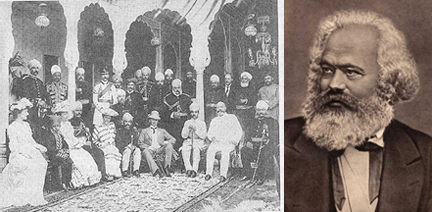
Lord Curzon in white, left; Karl Marx, right (for a change)
Of all the passages in Edward Said’s polemical Orientalism (1978), the one that most offended his natural allies on the left was placing Karl Marx in the den of Orientalist iniquity. What are “the sources of Marx’s conceptions about the Orient� For Said they are no different than the prejudice of Renan or Lord Curzon.
“These are Romantic and even messianic: as human material the Orient is less important than as an element in a Romantic redemptive project. Marx’s economic analyses are perfectly fitted thus to a standard Orientalist undertaking, even though Marx’s humanity, his sympathy for the mystery of people, are clearly engaged. Yet in the end it is the Romantic Orientalist vision that wins out, as Marx’s theoretic socio-economic views become submerged in this classically standard image…†(Said, Orientalism, 1979, p. 154)
The quote from Marx that follows, and supposedly damns him, is as follows:
“England has to fulfill a double mission in India: one destructive, the other regenerating – the annihilation of the Asiatic society, and the laying of the material foundations of Western society in Asia.â€
Said does not bother to note that the above quote is not take from the same article he quotes extensively earlier, although that is the impression given. Instead he cites this one sentence as proof that Marx is guilty of “regenerating a fundamentally lifeless Asia†as “a piece of pure Romantic Orientalism†(p. 154). Then he asks, quite rhetorically, where Marx’s human sympathy has gone. That sympathy is there, quite visible in the total context of Marx’s quoted article, all along and it has hardly been obscured by an abstract “Orientalist vision†created through Said’s selective reading of his words.
In my Reading Orientalism: Said and the Unsaid (2007), I noted a number of cases where Said dangled quotes out of context to fit his overarching concept of Orientalist discourse. The partial quoting of Marx follows the same misleading pattern. The lengthy quote from Marx on pp. 153-154 in Said’s text has an ellipsis, although I suspect few readers have actually looked to see what was missing. For those interested, here is the rest of Marx’s paragraph:
“We must not forget the barbarian egotism which, concentrating on some miserable patch of land, had quietly witnessed the ruin of empires, the perpetration of unspeakable cruelties, the massacre of the population of large towns, with no other consideration bestowed upon them than on natural events, itself the helpless prey of any aggressor who deigned to notice it all all. We must not forget that this undignified, stagnatory, and vegetative life, that this passive sort of existence evoked on the other part, in contradistinction, wild, aimless, unbounded forces of destruction, and rendered murder itself a religious rite in Hindustan. We must not forget that these little communities were contaminated by distinctions of caste and by slavery, they they subjugated man to external circumstances instead of elevating man to be the sovereign of circumstances, that they transformed a self-developing social state into never changing natural destiny, and thus brought about a brutalizing worship of nature, exhibiting its degradation in the fact that man, the sovereign of nature, fell down on his knees in adoration of Hanuman, the monkey, and Sabbala, the cow.â€
To the extent Marx is guilty, and he is hardly alone, of saying that human inhumanity crosses all cultures, this is hardly a romanticizing of the collective other. In his essay Marx minces no words in condemning the “misery inflicted by the British on Hindustan,†nor in equating the “brutal interference of the British tax-gatherer and the British soldier†with the trade-minded “blowing up of their economic basis†to produce a “social†revolution. But the part left out by Said in his quote is just as relevant for us today as it was for Marx. Caste and slavery are not creative inventions of the Western imagination of the Orient. Timur entered the imagination of Europe as Tamerlane, but his brutality was his own. I am not defending Marx’s mid-19th century understanding of the history of the Indian continent (nor his outmoded concept of “Oriental despotism,” which Said ignores), but if anything Marx is drawing attention to the equality of West and East in terms of brutal power over the common man, usually in the name of religion. Indeed, Marx needed no quote from Goethe’s poetry to rail against such brutality. To imply, as Said does, that Marx did not fully recognize the suffering of Orientals as it relates to the machinations of Western imperialism and economic exploitation is the only imaginary at play here.
Daniel Martin Varisco